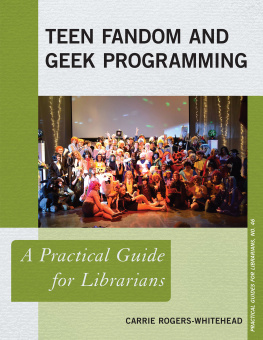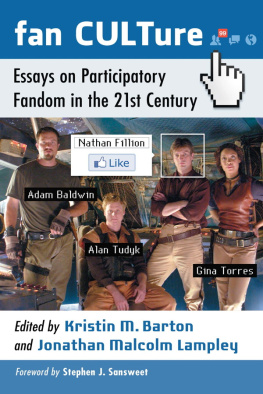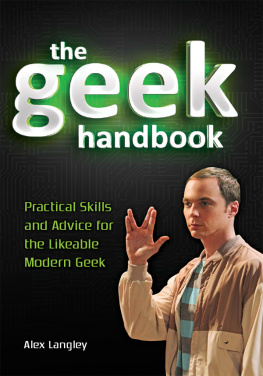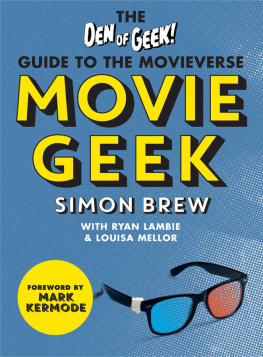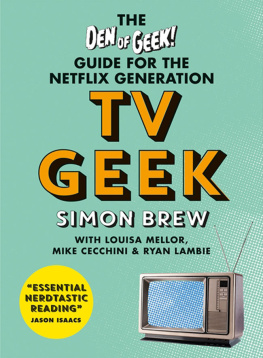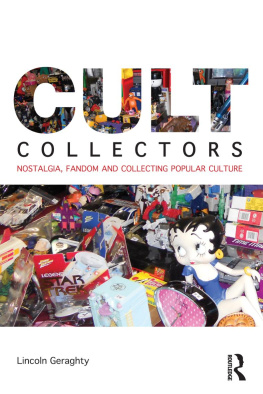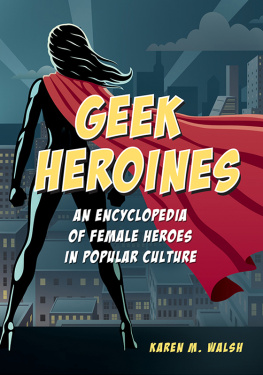Contents
Guide
Pagebreaks of the print version
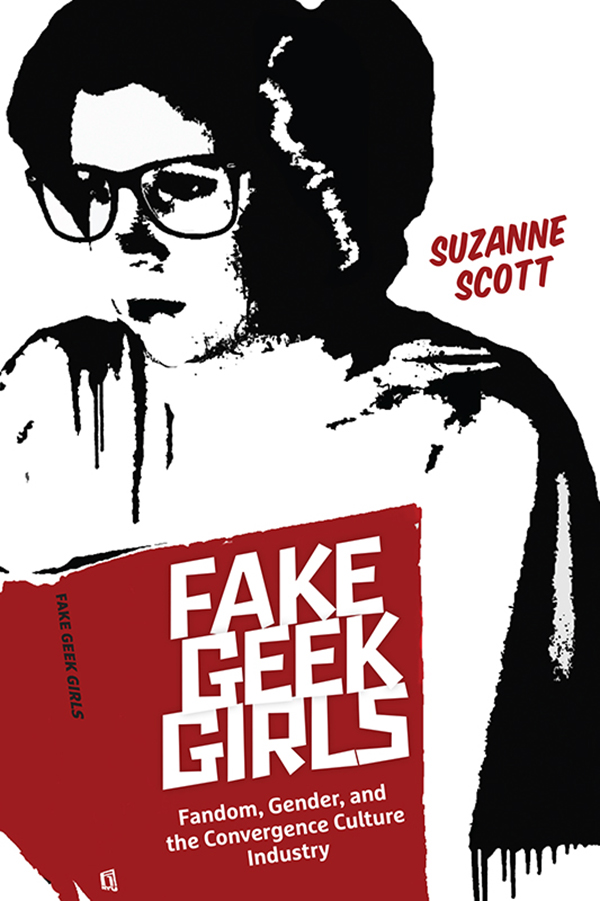
FAKE GEEK GIRLS
CRITICAL CULTURAL COMMUNICATION
General Editors: Jonathan Gray, Aswin Punathambekar, Adrienne Shaw
Founding Editors: Sarah Banet-Weiser and Kent A. Ono
Dangerous Curves: Latina Bodies in the Media
Isabel Molina-Guzmn
The Net Effect: Romanticism, Capitalism, and the Internet
Thomas Streeter
Our Biometric Future: Facial Recognition Technology and the Culture of Surveillance
Kelly A. Gates
Critical Rhetorics of Race
Edited by Michael G. Lacy and Kent A. Ono
Circuits of Visibility: Gender and Transnational Media Cultures
Edited by Radha S. Hegde
Commodity Activism: Cultural Resistance in Neoliberal Times
Edited by Roopali Mukherjee and Sarah Banet-Weiser
Arabs and Muslims in the Media: Race and Representation after 9/11
Evelyn Alsultany
Visualizing Atrocity: Arendt, Evil, and the Optics of Thoughtlessness
Valerie Hartouni
The Makeover: Reality Television and Reflexive Audiences
Katherine Sender
Authentic: The Politics of Ambivalence in a Brand Culture
Sarah Banet-Weiser
Technomobility in China: Young Migrant Women and Mobile Phones
Cara Wallis
Love and Money: Queers, Class, and Cultural Production
Lisa Henderson
Cached: Decoding the Internet in Global Popular Culture
Stephanie Ricker Schulte
Black Television Travels: African American Media around the Globe
Timothy Havens
Citizenship Excess: Latino/as, Media, and the Nation
Hector Amaya
Feeling Mediated: A History of Media Technology and Emotion in America
Brenton J. Malin
The Post-Racial Mystique: Media and Race in the Twenty-First Century
Catherine R. Squires
Making Media Work: Cultures of Management in the Entertainment Industries
Edited by Derek Johnson, Derek Kompare, and Avi Santo
Sounds of Belonging: U.S. Spanish-language Radio and Public Advocacy
Dolores Ins Casillas
Orienting Hollywood: A Century of Film Culture between Los Angeles and Bombay
Nitin Govil
Asian American Media Activism: Fighting for Cultural Citizenship
Lori Kido Lopez
Struggling for Ordinary: Media and Transgender Belonging in Everyday Life
Andre Cavalcante
Wife, Inc.: The Business of Marriage in the Twenty-First Century
Suzanne Leonard
Dot-Com Design: The Rise of a Useable, Social, Commercial Web
Megan Sapnar Ankerson
Postracial Resistance: Black Women, Media, and the Uses of Strategic Ambiguity
Ralina L. Joseph
Netflix Nations: The Geography of Digital Distribution
Ramon Lobato
The Identity Trade: Selling Privacy and Reputation Online
Nora A. Draper
Media & Celebrity: An Introduction to Fame
Susan J. Douglas and Andrea McDonnell
Fake Geek Girls: Fandom, Gender, and the Convergence Culture Industry
Suzanne Scott
Fake Geek Girls
Fandom, Gender, and the Convergence Culture Industry
Suzanne Scott

NEW YORK UNIVERSITY PRESS
New York
NEW YORK UNIVERSITY PRESS
New York
www.nyupress.org
2019 by New York University
All rights reserved
A portion of was first published as the article The Hawkeye Initiative: Pinning Down Transformative Feminisms in Comic-Book Culture through Superhero Crossplay Fan Art by Suzanne Scott from Cinema Journal 55:1, pp. 150160. Copyright 2015 by the University of Texas Press. All rights reserved.
References to Internet websites (URLs) were accurate at the time of writing. Neither the author nor New York University Press is responsible for URLs that may have expired or changed since the manuscript was prepared.
ISBN: 978-1-4798-3860-8 (hardback)
ISBN: 978-1-4798-7957-1 (paperback)
For Library of Congress Cataloging-in-Publication data, please contact the Library of Congress.
New York University Press books are printed on acid-free paper, and their binding materials are chosen for strength and durability. We strive to use environmentally responsible suppliers and materials to the greatest extent possible in publishing our books.
Manufactured in the United States of America
10 9 8 7 6 5 4 3 2 1
Also available as an ebook
For Luke, my favorite fanboy.
CONTENTS
Introduction
Make Fandom Great Again
In a March 2017 interview with ICv2 , Marvel Comics senior vice president of sales and marketing, David Gabriel, blamed a slump in OctoberNovember comic book sales on the changing tastes of comic book readers. More precisely, Gabriel blamed the sales slump on a perceived lack of changing tastes among comic book readers. In a quotation that rapidly spread across digital fan platforms like Twitter and Tumblr, Gabriel bluntly stated, What we heard [from some comic retailers] was that people didnt want any more diversity. They didnt want female characters out there. Thats what we heard, whether we believe that or not. I dont know that thats really true, but thats what we saw in sales. It is significant that Gabriels comment conflates diversification with the development of female characters, particularly considering that Marvel Comics diversity initiatives of the past several years have included racially recasting iconic superheroes such as Spider-Man (mixed-race teen Miles Morales, who first donned the webslingers suit in 2011) and Captain America (with Caps black friend and fellow superhero Sam Wilson taking up the iconic shield in 2015).
There are two primary takeaways from Gabriels statement. The first is that the blame for Marvel Comics sales slump lies with female comic book fans, particularly those who have vocally criticized comic books lack of creative and representational diversity. This framing reaffirms that Marvel still considers women to be a surplus audience for mainstream superhero comics, and that they presume male readers are unlikely to invest (emotionally or economically) in female-led titles. Placing the blame on female fans for a sales slump precipitated by an array of issues, ranging from oversaturation of the market
Facing immediate pushback from predominantly female and minority comic book fans, and a wave of think pieces contesting his statistical claim about the comparatively low sales for diversity titles, Gabriel quickly walked back his response. Clarifying that Marvel remained committed to its newer female characters, Gabriel suggested that he was merely responding to comic retailers concerns about the companys perceived abandonment of the core Marvel heroes. and other fans were quick to draw parallels between the erosion of Captain Americas character and more cancerous forms of prejudice spreading through geek culture and society at large.
The past decade has been marked by growing fan activist efforts surrounding issues of diversity in media production cultures, and pushback from mostly cisgendered, heterosexual (cishet, hereafter), white, male fans who view these efforts as an unwelcome encroachment of political correctness and SJWs (a pejorative term deployed by antifeminist, racist, homophobic, or transphobic commenters online to disparage social justice warriors) into geek and fan culture. As the aforementioned controversy surrounding Gabriels comment makes clear, industrial diversity initiatives are often viewed skeptically by marginalized fans as performative or perfunctory, particularly when they are ultimately wielded to justify the industrys commitment to preexisting demographic conceptions of fans as straight, white men. A vicious cycle has accordingly emerged: minority fans offer justified critiques of hegemonic production cultures and media representations, content producers offer (routinely half-hearted) responses to speak back to these concerns, and media industries dismiss minority fans textual predilections as too niche when these efforts are not immediately successful, thus further empowering a segment of entitled white, straight male fans to dismiss minority fans concerns and invalidate their claim to authentic fan identity.


